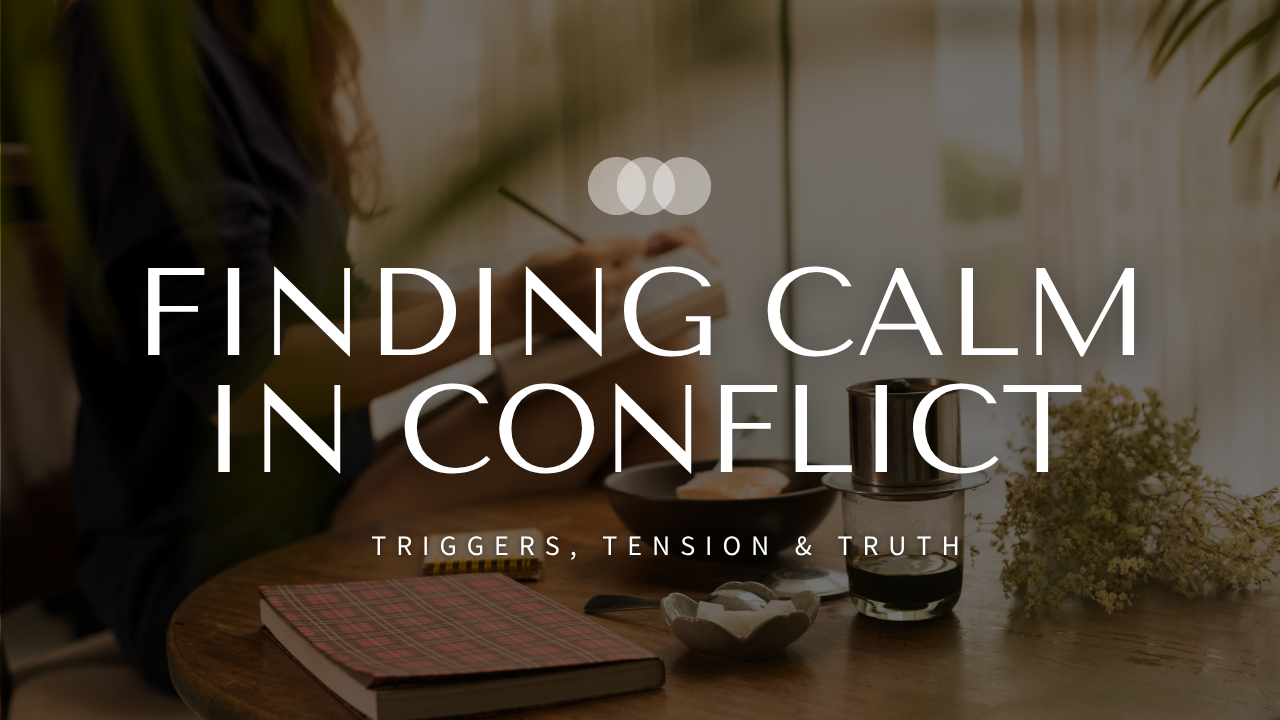How to Survive Your Family This Holiday Season (Without Losing Your Mind… or Your Peace)

You're already mentally preparing for that one relative who's going to ask why you're still single, critique your career choices, or start a political debate over the dinner rolls.
You know the drill: You walk in feeling zen and centered, and within 20 minutes you're either hiding in the bathroom scrolling your phone or seriously considering if it's too late to fake a stomach bug.
Here's the thing — it's not just your family.
Every family gathering is basically a reunion of everyone's unhealed communication patterns, all sitting around the same table, passing the mashed potatoes and triggering each other's childhood wounds.
Fun times, right?
But this year? You're going in prepared. Below are the 8 communication patterns you're guaranteed to encounter, plus the exact tools to help you stay sane.
Because honestly, if we don't laugh about this stuff, we'll cry into the cranberry sauce.
#1 The Mind Reader
Your sister pulls you aside because your "hello" wasn't enthusiastic enough and now she's convinced you’re mad at her.
Mind Readers assume they know what everyone is thinking and feeling without anyone actually saying it. They've turned assumption into an art form, and unfortunately, they're usually assuming the worst.
Why they do this: This pattern typically develops from childhood hypervigilance - they learned to read emotional cues as a survival mechanism to stay safe in unpredictable environments. Now their nervous system is constantly scanning for threats that aren't actually there.
How to handle them:
Say exactly what you mean - Don't leave room for interpretation. Mind readers will fill in the blanks with their worst fears.
- Instead of: "I'm fine."
- Try: "I'm good, just focused on getting dinner ready. Really glad you're here."
Address their assumptions directly - When they start mind reading, gently correct it:
- "I can see you're worried I'm upset, but I'm actually just thinking about work.”
Give them reassurance proactively - Beat them to the punch with clear communication:
- "I'm quieter than usual today because I'm tired, but I'm happy to be here with everyone."
#2 The Avoider
Your dad, who disappears to organize the garage the moment anyone mentions feelings.
Avoiders have mastered the art of vanishing at the first sign of emotional discomfort. They'd rather clean out the gutters than have a heart-to-heart conversation.
Why they do this: Avoidance often stems from growing up in environments where emotions felt overwhelming or unsafe. They learned that withdrawing was the best way to protect themselves from conflict or emotional intensity.
How to handle them:
Keep interactions light and brief - Don't try to force an emotional connection when they're uncomfortable:
- Stick to safe topics: weather, sports, and current projects they're working on.
Give them useful tasks - They feel more comfortable contributing through action rather than conversation:
- "Dad, could you help me move this table?" or "Want to check if the grill needs more propane?"
Don't chase them when they withdraw - Respect their need for space:
- If they retreat, let them go. Say: "No pressure to chat. I'll be in the kitchen if you need anything."
#3 The Emotional Reactor
Your mom, who gets visibly upset when your brother mentions he might leave early, and suddenly the whole room feels tense.
Emotional Reactors feel everything intensely, and their emotions can shift the entire atmosphere of a room. Their feelings are immediate, big, and often disproportionate to the trigger.
Why they do this: This usually develops from environments where emotions were either dismissed or overly dramatic. They learned that big emotional reactions were the only way to get their needs met or feel seen/heard.
How to handle them:
Stay calm and don't match their energy - If they're at a 10, you stay at a 3:
- Use a steady, calm voice: "I can see you're upset. How can I best support you right now?"
Validate without getting pulled into the drama - Acknowledge their feelings without joining the emotional storm:
- "I can see this really matters to you" or "I hear that you're frustrated."
Set a gentle boundary if needed - If their reaction is affecting everyone:
- "I want to help, let's take a step back and talk about this more calmly.”
#4 The Dominator
Your brother-in-law, who must correct every story you tell and somehow ends up mansplaining your own childhood to you.
Dominators need to be right, need to control conversations, and turn every interaction into a competition they must win. They interrupt, correct, and take over discussions.
Why they do this: Dominating behavior often masks deep insecurity or anxiety. Controlling conversations helps them feel stable and important, especially if they grew up feeling powerless or unheard.
How to handle them:
Don't take the bait - They want you to argue so they can "win." Don't engage:
- "That's an interesting perspective," then redirect: "Hey, did anyone try Mom's new recipe?"
Use the broken record technique - Pick your boundary and calmly repeat it:
- "I'm not discussing politics today." Don't elaborate, don't justify, just repeat.
Give them something to control - Channel their need for dominance into something useful:
- "You're so good at organizing. Could you help figure out the best way to arrange these leftovers?"
#5 The Pleaser
Your cousin who apologizes for existing and offers to help 47 times after being told to sit down and relax.
Pleasers have turned people-pleasing into an Olympic sport. They'd rather exhaust themselves than risk anyone being even slightly annoyed with them.
Why they do this: People-pleasing typically develops from childhood experiences where love felt conditional on being "good" or helpful. They learned that their worth depended on making others happy, even at their own expense.
How to handle them:
Give them clear permission to relax - They need explicit permission to stop helping:
- "Everything is completely handled. Your only job today is to enjoy yourself."
Be specific if you want help - Vague responses increase their anxiety:
- Instead of "Don't worry about it," try: "Actually, yes, could you grab the extra napkins from the kitchen?"
Reassure them when conflict happens - They'll blame themselves for any tension:
- When Uncle Bob starts his rant: "This has nothing to do with you. You didn't cause this, and you don't need to fix it."
#6 The Analyzer
Your aunt, who whispers running commentary about everyone's behavior like she's conducting a live sociology experiment.
Analyzers approach family gatherings like they're writing a research paper on human behavior. They focus on facts, logic, and details while often missing the emotional undercurrents.
Why they do this: Over-analyzing is often a way to feel in control of unpredictable social situations. By intellectualizing everything, they avoid feeling vulnerable or emotionally overwhelmed.
How to handle them:
Don't get pulled into the analysis - They want you to co-investigate everyone's behavior:
- "Maybe, or maybe he's just tired. This stuffing is really good - what do you think?"
Redirect to present-moment experiences - Pull them out of their head:
- "What's your favorite thing about Mom's cooking?" or "Have you tried this new wine?"
Set a gentle boundary if needed - If their analysis is making you uncomfortable:
- "I'm trying to just enjoy the party without analyzing everything. Takes up too much brain power that I don’t have right now. Can we talk about something else?"
#7 The Guilt-Tripper
Grandma, who says, "Oh, store-bought dessert? I guess homemade is too much to ask these days," with that special smile that makes you question all your life choices.
Guilt-Trippers use emotional manipulation disguised as innocent comments. They've mastered the art of making others feel bad for their choices without directly stating their disapproval.
Why they do this: Guilt-tripping often develops when direct communication feels unsafe or ineffective. They learned that indirect emotional pressure was the only way to get their needs met or feel important. Passive-aggressive comments fall in this category, too.
How to handle them:
Don't absorb their narrative - Just because they're trying to create guilt doesn't mean you have to feel it:
- Stay neutral: "I love you too, and store-bought works for me today."
Don't over-explain or justify - The more you defend your choices, the more ammunition you give them:
- Instead of explaining your busy schedule, simply say: "Yep, went with store-bought this year."
Use strategic validation - Sometimes a little acknowledgment deflates their need to guilt-trip:
- "Your homemade desserts are always incredible. This year I decided to keep things simple."
#8 The Stonewaller
Your uncle, who gives you the silent treatment and suddenly becomes very interested in his phone when anyone tries to address the elephant in the room.
Stonewallers shut down emotionally and withdraw from conversations, especially when things get uncomfortable. They're physically present, but emotionally, they've left the building.
Why they do this: Stonewalling is a protective mechanism that usually develops when someone feels overwhelmed by conflict or emotions. They learned that shutting down was safer than engaging when things got intense.
How to handle them:
Don't take it personally - Their shutdown isn't about you, it's their coping mechanism:
- Remind yourself: "This is about their comfort level, not my worth."
Keep interactions brief and low-pressure - Don't try to force connection when they're in shutdown mode:
- "No pressure to stay here and chat. There’s a movie on in the living room if you're interested."
Give them an easy out - Provide escape routes that don't feel like rejection:
- "Want to help me grab some drinks from the cooler outside?" (Gets them away from the emotional intensity)
Remember This...
It's NOT just your family that's dysfunctional. All families are, in their own special ways.
These patterns aren't character flaws - they're survival strategies people learned long before they had the awareness to choose differently. When you understand the "why" behind someone's behavior, it becomes less about you and more about their own unhealed patterns.
You don't have to engage with every comment, fix every problem, or manage everyone's emotions. Your job is to show up as your best self and protect your peace.
Focus on what you can control: your responses, your boundaries, your energy. Let the rest go.
And remember - you're not responsible for managing other people's emotions. You're only responsible for your own.
The holidays and family will always be complicated. But with more awareness, boundaries, and a little humor, I think they can also create opportunities for connection.
And lastly, remember that you turn into some of these characters, too! None of us is exempt from this because we all have egos that get poked at times. So remember to tap into a little compassion and humility, it’ll go a long way this holiday season.

🗓️ Upcoming Workshop - November 25 🗓️
What You’ll Learn
Conflict feels hard because we react before we understand what’s happening inside of us. In this workshop, you’ll learn how to recognize your triggers, understand your patterns, and stay grounded when emotions rise.
By the end, you’ll be able to:
-
Spot your go-to reactions in tense moments
-
Understand what those reactions really mean
-
Respond with clarity instead of reacting on autopilot
-
Use simple tools to calm your nervous system
-
Protect your peace without shutting down or people-pleasing
It’s one thing to know you’re triggered...it’s another to understand what to do in that moment. When you can interpret your reactions instead of getting swept up in them, conflict becomes less draining and a lot more manageable. This work gives you practical tools to navigate tense moments with clarity and self-trust.


